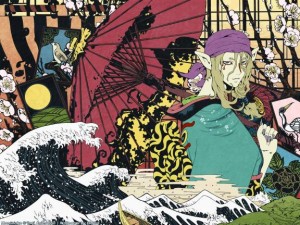I have a hard time sympathizing with anyone who says, point blank, “I don’t like anime,” especially when their experience with it is limited to childrens’ television dubs. “I don’t watch anime” is fine and honest, but stating the former just presents itself as being really ignorant. When I first started here at Amazing, I mentioned that writing about anime as a genre is kind of impossible because, quite frankly, anime is not a genre. It’s nothing more than a style of animation, a medium through which people tell stories. And while I’ve tried to be as inclusive as possible with the types of things I discuss, I have obviously played favorites; I like anime, but not all anime. I like films, too, but not all genres of film. See what I’m getting at?
There are people will say “well, I just don’t like the art style.” You know something? I also don’t love the overdone, connect-the-dots, generic “anime” style. But what you see in the How To Draw Manga books isn’t actually what animanga looks like. The stylistic differences between Dragonball Z and Mononoke, for example, are too copious to enumerate. It’s okay to not find yourself attracted to a particular art or animation style (I choose series this way much of the time), but it’s not okay to assume that all anime, and their predecessors in manga, are created equally.
That all being said, I can understand that not everyone is going to want to invest the time and energy in finding those titles that they would potentially like. There are a lot of very intrinsically Japanese cultural elements that are central to many series, and that can be difficult to get a hang of at first (one of the biggest difficulties I hear people facing is that Japanese cinematic/visual pacing is much slower). I get that, I honestly do. But it bothers me when I can tell people aren’t interested because it’s Japanese. Writing off an entire medium because it’s “too different” has the distinct whiff of passive racism about it. That is to say, I don’t think people intend to be harmful by rejecting anime, but they’re also entirely unaware that disliking something by virtue of it’s other-ness is problematic. There’s definitely a reason that Cowboy Bebop and Akira are the most popular titles among non-anime fans Stateside in my experience; neither of these titles are so entrenched in Japanese customs or daily life as to be non-consumable by a Western audience; Bebop is intentionally very American, and though you can argue that Akira is very Japanese in its grim, post-apocalyptic Tokyo (the WWII bombings at Hiroshima and Nagasaki set a huge precedent for a cultural obsession with the end times), the characters are very universal types in a very recognizable cityscape.
I completely understand that we all can’t have the same hobbies and interests. I honestly don’t even want everyone to be anime fans. But there is a kind of shame associated with being a fan (of anything that’s not mass-media), such that people will dismiss anime without a second thought. My roommate, Manda, really loved anime as a kid—Pokemon, Dragonball Z, Cardcaptor Sakura, you name it. But by the time she got to early high school, anime wasn’t cool anymore. Cue the denial phase! Now that she lives with me, she’s letting her otaku flag fly free, re-immersing herself in her old FAKE manga, watching all of the subbed Cardcaptor Sakura, and now starting CLAMP’s alternate universe title, Tsubasa: Reservoir Chronicle. Even my fiance, who associated most anime with annoying people in high school, is now halfway through One Piece—which means he just finished episode number 330. I didn’t talk about manga much myself throughout high school, simply because I only had a couple friends who were interested (but everyone knew that I liked it because, like so many teenage comic fans the world over, I carried my sketchbook everywhere).
I guess that all I’m trying to say here is please don’t knock it til you’ve tried it. If you’re seriously not interested in making the effort, that is fine. But you can say, “I honestly don’t know much about anime,” or “I haven’t seen any anime that I’ve liked so far.” We need to stop treating anime like it’s all one big genre; the only uniting factor is that it’s all cartoons from Japan. Also, it’s kind of rude to admit to someone who does like anime that you think their hobby is childish, irrelevant, and inferior. We all got enough of that in middle and high school—we grew up, and we would appreciate it if everyone else did, too.














Recent Comments